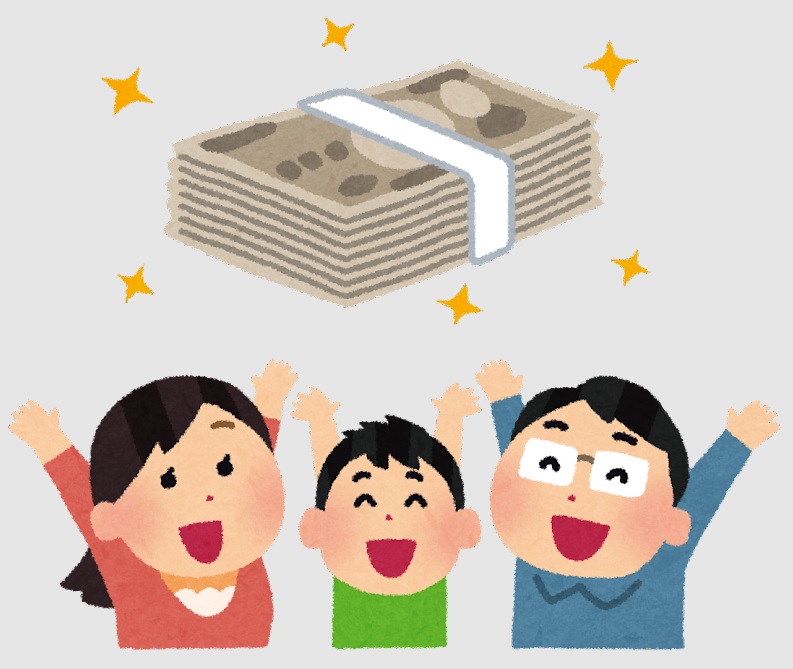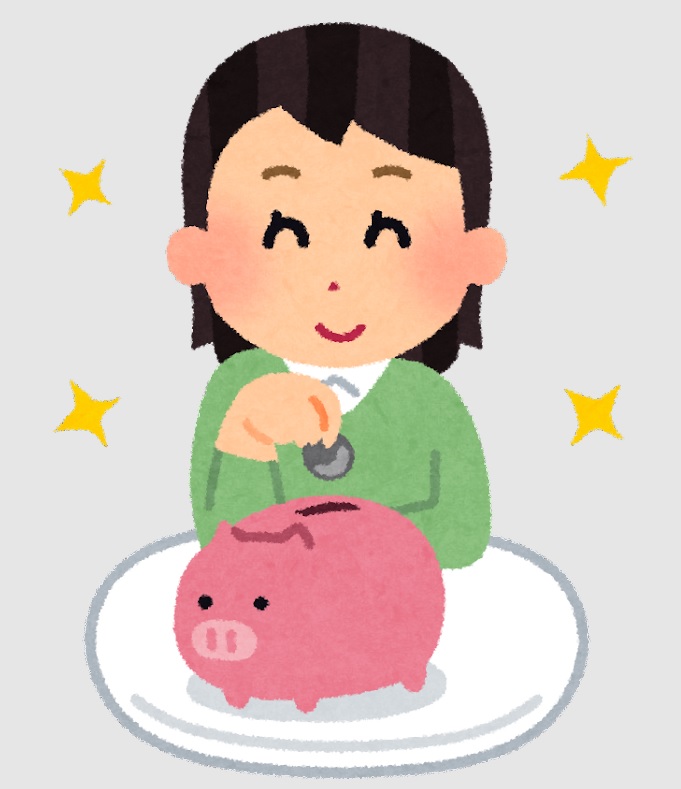「出来るようになります|生活費の味方、賢いお金の貯め方」
〜前回のつづき〜
●借金返済 vs 貯金、どっちが先?~金利で優先順位が決まる!~

奨学金と借金
どっちを優先して返済すべきか?
これは金利によります。
奨学金とかであれば
繰上げ返済した方が
いいのかどうかというのは
今までのお話しの中で
お話ししてますので
参考にしてほしいんですけど
結論から言えば
奨学金の場合であれば
別に急いで返さなくても
金利がすごく安いので
借金返済ではなくて
最低限の生活防衛資金
貯金を先に貯めた方がいいです。
・リボ払い
・カードローン
・消費者金融
でお金を借りてるのであれば
金利が10〜15%有ると思うので
これは先に返していった方がいいです。
奨学金みたいに金利が低いものであれば
生活防衛資金を貯める方が先です。
●生活防衛資金っていくら貯めれば安心?

生活防衛資金とは
いくら貯めればいいのか?
年収ではなく
『生活費』の6ヶ月〜1年分。
生活費のというところが
ポイントです。
生きるための最低限の生活費ですね。
だから仮に
給料が30万円の人が

「6ヶ月分だから180万円貯めないといけないなぁ」
ではなくて
生活費。
なんとか切り詰めたら
何とかとりあえず
20万円有ればいけるというのであれば
20万円の6ヶ月分の120万円ですね。
それは
・住んでる地域
・実家が近くにある
など人によって
条件が違うと思うんですけど
生活費の半年〜1年分を貯めればいい。
あとは

定期収入があるかどうかでも
違います。
会社員であれば
6ヶ月で十分だと私は思うんですね。
十分とまではいかなくても
最低限は有る。
なぜなら
自営業にくらべていきなり
来月から給料がなくなる
収入が途絶えるという事が
少ないからですね。
会社員と比べると
自営業というのは
突然仕事がなくなったりする。
会社員の場合であれば
給料はある程度保証されてますよね。
安定してる。
だから会社員だったら
6ヶ月分でいいんじゃないかと思います。
そして自営業と違って
失業保険がある。
会社を仮に急にクビになったりとか
何か事情でやめなければならなくなっても
数ヶ月の間〜半年間分は
給料の50〜80%程度が
失業保険として大体もらえるので
自営業ほど貯める必要は無い。
そして傷病手当もある。
病気で働けなくなっても
会社員であれば必ず入ってる
公的保険から色々出る。
この辺も
いままでのお話しの中で
してきてますので
参考にしてほしいと思います。
自営業であれば
会社員に比べて色んな
手当や保証が少ないので
1年分くらい必要です。
最低限貯まったら

そこからは投資に回しましょう。
貯めるばっかりでも
投資をしないど貧乏になっちゃう
世の中の仕組みになっている。
r>g (「r」は資本収益率、「g」は経済成長率)

(出典:wikipedeia)
ピケティの法則ですね。
貯めるばっかりであれば
なかなか楽にならない。
それは色んな事情がある。
今の世界の仕組みが
そうなんだという
お話しもしてきました。
最低限貯めたら
そこからは投資にまわす。
一回最低限貯めないといけないのに
貯めたお金を
今度は投資に放り投げないといけない。
なかなか勇気がいりますよね。
投資もしていかないと
投資のチャンスを失ってしまいます。
だからそこが
精神的に難しいところです。
理解していけば
出来るようになります。
〜〜〜つづく〜〜〜
Special Thanks college president Ryo.
●おまけ
≪≪Chat-GPTくんによる要約→perplexityちゃんによる文章まとめ≫≫
借金返済と貯蓄の優先順位は金利で決まります。低金利の奨学金は後回しにし、生活防衛資金を優先して貯めましょう。高金利のリボ払いやカードローンは早めに返済すべきです。
生活防衛資金の目安は生活費の6ヶ月〜1年分。会社員なら6ヶ月分、自営業なら1年分を目安に貯めましょう。会社員は失業保険や傷病手当があるため、自営業より少なめでOKです。
生活防衛資金が貯まったら、投資を始めましょう。貯蓄だけでは経済成長に追いつけず、資産を増やすのが難しくなります。投資には勇気が要りますが、チャンスを逃さないようにすることが大切です。
Citations:
[1] https://www.kaiketu-saimuseiri.jp/16548379332700
[2] https://money-sense.net/6036/
[3] https://financial-field.com/household/entry-18620
[4] https://mbp-japan.com/hyogo/universal-fp/column/5094073/
[5] https://allabout.co.jp/gm/gc/12119/
[6] https://www.a-tm.co.jp/top/cardloan/money-knowledge/scholarship-return/
[7] https://legaltec.jp/saimu/2022/08/04/column432/
≪≪Chat-GPTくんによる英訳≫≫
~Continuation from the previous post~
【Debt Repayment vs. Savings: Which Comes First? – The Priority Depends on Interest Rates!】
Should you prioritize repaying student loans or other debts?
It depends on the interest rates.
If you have student loans, whether to pay them off early is something we’ve discussed before, so refer to that.
To put it simply, if it’s a student loan, there’s no need to rush repaying it since the interest rate is very low. Instead of focusing on repaying the debt, it’s better to prioritize saving a minimum emergency fund.
If you’re borrowing through high-interest loans, such as:
– Revolving payments (credit cards)
– Personal loans
– Consumer finance
These loans likely have an interest rate between 10–15%, so it’s better to prioritize repaying these first.
For loans with low interest rates like student loans, focus on building your emergency savings first.
—
【How much emergency savings is enough to feel secure?】
How much should you save as your emergency fund?
It’s not based on your income but on 6 months to a year’s worth of living expenses.
The key point is “living expenses,” which refers to the minimum amount needed to live.
For example, if someone earns 300,000 yen a month, they might think they need to save 1.8 million yen for 6 months. However, it’s not about the full salary but the minimum living expenses.
If you can manage to live on just 200,000 yen a month, then 6 months’ worth would be 1.2 million yen.
This amount depends on factors such as:
– Where you live
– If your family lives nearby
Living expenses can differ depending on these circumstances, but the goal is to save 6 months to a year’s worth of living expenses.
Additionally, the presence of a regular income will influence how much you need to save.
For salaried employees, I believe 6 months’ worth of savings is enough. While not ideal, it’s the minimum necessary, since employees are less likely to face sudden income loss compared to self-employed individuals.
Self-employed people face greater risk because work can suddenly stop, whereas salaried employees usually have a steady income and some job security. Therefore, employees only need about 6 months’ worth of savings.
Moreover, salaried employees also have the benefit of unemployment insurance, which provides 50-80% of their salary for several months in case of unexpected job loss.
For self-employed individuals, the situation is different, as they have fewer guarantees and benefits. So, they should aim for a full year’s worth of savings.
Once you’ve built up the minimum savings, the next step is to invest.
If you only focus on saving, you’ll struggle financially because the world’s financial system favors investment. According to the r > g rule (where “r” is the rate of return on capital and “g” is the rate of economic growth), just saving won’t help you achieve financial freedom.
If you only save, it’s hard to improve your financial situation. Understanding this system is essential.
Once you’ve saved enough for the minimum, shift your focus to investing. It may be hard at first to invest the money you’ve carefully saved, but it’s necessary to take the leap. Without investing, you miss out on opportunities to grow your wealth.
This is a challenging mental hurdle, but once you understand the process, it becomes more achievable.
Special Thanks OpenAI and Perplexity AI, Inc


